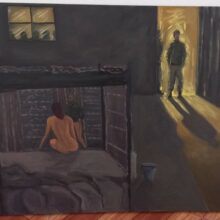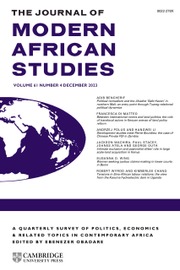-
- Get access
- Contains open access
- ISSN: 0022-278X (Print), 1469-7777 (Online)
- Editor: Ebenezer Obadare Council on Foreign Relations, USA
- Editorial board
DAVID AND HELEN KIMBLE PRIZE
The editors of the Journal of Modern African Studies are proud to announce the David and Helen Kimble Prize, to be awarded annually to the author(s) of the best academic article published in the journal in the previous calendar year. The prize will be adjudicated by the editors of the Journal of Modern African Studies. The prize is named in honour David and Helen Kimble who co-founded the journal in 1963. David, who went on to edit the journal for 35 years, passed away in 2009; Helen, who coedited the journal until 1972, passed away in 2019.
We are delighted to announce that the winner for 2019 is Gretchen Baldwin, for her article Constructing identity through commemoration: Kwibuka and the rise of survivor nationalism in post-conflict Rwanda, vol. 57, issue 3. Based on intensive fieldwork, and combining empirical observation with critical analysis, Baldwin’s article is in the best tradition of the journal. She details how official commemoration of the 1994 genocide in Rwanda paradoxically focuses on questions of ethnicity i.e. ‘the genocide of the Tutsis,’ even as official policy actively avoids discussing ethnic identity. In doing so, the characterisation of the ‘Tutsi’ as sole victims and implicit survivors has engendered a potentially destabilising self-image and a form of ‘survivor nationalism’ among ‘Tutsi’ youth, which aggravates societal friction. The article’s theoretically-informed analysis makes a solid contribution to our understanding of current dynamics in Rwanda, as well as broader questions relating to identity politics in contemporary Africa.
To see the full announcement, please click here.
Featured content
Area Studies « Cambridge Core Blog

-
Meet the Editors: Tristan R. Grunow and Mary M. McCarthy, Editors for Asia-Pacific Journal
- 17 March 2025,
- We are pleased to introduce ourselves to the Cambridge Core family as the co-editors of Asia-Pacific Journal: Japan Focus. Tristan is a professor of modern...

-
Military Intimacies: Peruvian Veterans and Narratives about Sex and Violence
- 11 February 2025,
- Many researchers and writers have considered the question why soldiers in conflict situations rape civilian and enemy populations. Few works have been able...

-
The importance of open access publishing for the arts and humanities
- 20 December 2023,
- Between 2012 and 2014, I held a two-year Wellcome Trust Research Leave Award (WT096499AIA) for a project on women surgeons in Britain, 1860-1918.…
History & Classics - Fifteen Eighty Four | Cambridge University Press
-
Negative Freedoms in Twentieth-Century Europe
- 07 May 2025,
- How can individual freedom be historicised in the context of twentieth-century Europe? When setting out to answer this question I found myself grappling with The post Negative Freedoms in Twentieth-Century Europe first appeared on Fifteen Eighty Four | Cambridge University Press....


Facebook - History
Twitter - History